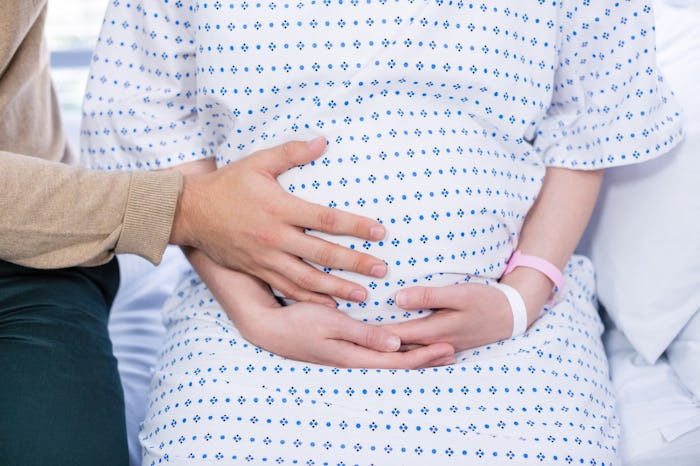Life
This Common Disorder Could Lead To Serious Pregnancy Complications, Study Finds
When it comes to endometriosis and pregnancy, the conventional wisdom has long been that one of the hardest parts of having the disease was in overcoming the symptoms and the fertility issues often associated with it in order to achieve a pregnancy. But findings from a new study on how endometriosis can impact pregnancy suggest that the challenges of endometriosis don’t go away when a woman becomes pregnant. In fact, the condition may play a far greater role in whether a woman develops a range of potentially serious pregnancy-related issues — including miscarriage, preterm birth, Caesarean delivery — than physicians realized.
Before unpacking the findings from this latest round of research, it’s important to understand what endometriosis is and how it might affect a woman’s reproductive health. According to the Endometriosis Foundation of America website, the disease occurs when the endometrial lining from a woman’s uterus attaches itself outside the uterus, in other areas of the pelvis. During ovulation and menstruation, the lesions can get aggravated, causing a range of painful, even debilitating physical symptoms. Extremely painful cramps, heavy menstrual flow, pain during sex, nausea, and bowel disorders are among the most commonly reported by patients, according to that website. And while the symptoms can begin in early puberty, it can take 10 years or longer for an accurate diagnosis.
So far, no one has identified a single, underlying cause for the disease, according to the EFA website, and an uneven understanding of endometriosis by the medical community has been one of the primary reasons that it’s difficult for women to get appropriate counsel and treatment. It's not uncommon for endometriosis sufferers to be misdiagnosed with ovarian cysts, irritable bowel syndrome, even hypochondria before finally getting help with the condition.
And so, to better understand the nature of the disease, a research team from Thomas Jefferson University Hospitals conducted a meta-analysis comprised of 24 different studies on endometriosis in pregnancy and the experiences of more than one million women. The findings were published this month in the medical journal Fertility and Sterility. According to a summary posted on the University website, the researchers found that women with endometriosis had a higher risk of several serious pregnancy-related complications, including preterm birth, miscarriage, Cesarean delivery and placenta previa. The study also showed that infants born to mothers with endometriosis were more likely to be small for their gestational age.
In an interview with the Philadelphia Inquirer on the study results, study co-author Vincenzo Berghella, director of maternal fetal medicine at Thomas Jefferson University Hospitals said that the results came as a surprise to the research team.
When we came up with this study, as a clinician, my personal take was that we weren’t going to find anything. In the past, if a pregnant patient said they had endometriosis, given the infertility issues, the ob-gyn would say, ‘Great, you’re pregnant.’ But now, you have to be aware of the risks.
Berghella told the Inquirer that undergoing surgery to remove the lesions or laparoscopic treatment to get a proper diagnosis — the most common course of treatment, according to the EFA — did not lessen the risks during pregnancy. In fact, all of the women with endometriosis observed in the study had undergone one or both procedures prior to pregnancy, he said.
The findings could certainly complicate treatment considerations for pregnant women already dealing with a complicated illness. According to the EFA website, women with endometriosis often experience some relief from its painful symptoms once becoming pregnant, due to the hormone changes in pregnancy. But these findings suggest that ignoring the condition could have serious consequences for both the mother and her baby.
Einstein Hospital OB-GYN Claire Robinson, who was not involved in the study, told the Inquirer that at a minimum, the findings should mean additional monitoring for patients. She said that currently, those patients are not automatically considered high risk for complications, but that might change.
The study will make us a little more aware of this problem and to counsel patients as to what evidence has been shown previously and what has been shown more recently to have possible effects on their pregnancy or well-being. It will impact on how we practice.
In a statement posted on the university website, Berghella explained that the associations were only visible in this study because of its massive size and scope.
Prior studies looking at this issue have reported conflicting results. Studies like ours help clarify the findings by pooling the data from many studies to give the field a more conclusive answer to a debated research question. The collective data is stronger than any single study alone and often helps shape opinion in the field.
For the one in 10 women with endometriosis worldwide, managing the disease is a physical and emotional challenge, especially because women so often have to advocate for years to get proper care, diagnosis, and treatment. This latest research suggests that the challenge of managing endometriosis doesn't end with just trying to become pregnant — and can actually complicate a pregnancy in ways that doctors hadn't understood. That's likely distressing to any pregnant woman managing the illness, but hopefully it will lead researchers to dig deeper into ways to help patients lower the risk for themselves and their babies.
This article was originally published on
